Chair’s message:
Succeeding with our customers

For more than 100 years, Shell’s people have provided much of what is needed for modern life: the energy to heat and light homes, the fuel for cars, trucks, ships and planes, the means to keep the world moving.
In early 2022, when Russia invaded Ukraine, Shell’s people stepped up. In Poland and other neighbouring countries, our employees helped refugees, caring for the victims of a senseless conflict.
Shell is also rising to another urgent challenge: the role we must play in helping to tackle climate change, caused for the most part by carbon emissions from the production and use of energy. The COP26 climate summit in Glasgow, Scotland, showed again that the overwhelming majority of countries agree that the world must transition to a low-carbon energy mix. For Shell to play our part will require boldness, ambition and a willingness to transform.
I feel honoured to be the Chair of Shell at such a pivotal stage in its history. Our Powering Progress strategy aims to help us generate shareholder value while achieving our net-zero emissions target, powering people’s lives and respecting the natural environment.
We can take heart from the fact that Shell has always thrived on its people’s ingenuity, adaptability and determination. We will need those qualities even more in the coming years.
With great challenges and changes come great opportunities. The energy transition is both our greatest challenge and our greatest opportunity. Our resilience will stand us in good stead. After the COVID-19 pandemic caused one of the world’s worst economic downturns, Shell took decisive steps to reshape for the future. We had the capital discipline and underlying strength to keep our strategy on track and to emerge with a foundation for future growth.
We should be realistic about the scale of the challenges that lie ahead. But we should also be optimistic about our ability to overcome them.
Working with our customers
The single most important key to our success in the energy transition will be our ability to work with customers. We have a network of 1 million commercial and industrial customers and around 32 million customers a day visit our 46,000 branded retail service stations.
By listening to our customers, learning from them and working with them, we can understand what they want and need as the world moves towards a lower-carbon future. We aim to use such insights to profitably provide the low-carbon products and services they will want to buy.
This approach will be crucial to Shell’s target of becoming a net-zero emissions energy business by 2050, in step with society’s progress towards achieving the goals of the Paris Agreement. Customers’ use of products accounts for the vast majority of energy-related carbon emissions. We can seize opportunities that help us and our customers.
For example, customers in industry and road freight are increasingly working to cut their emissions, to meet society’s expectations and comply with tighter environmental regulations. At one of our projects, we can now provide zero-emissions green hydrogen. As part of the Refhyne European consortium, we have installed an electrolyser at Shell’s Energy and Chemicals Park Rheinland, in Germany. It began operating in July and will use renewable electricity to produce up to 1,300 tonnes of green hydrogen a year.
We expect to develop new markets by building low-carbon businesses and forming strategic alliances that can help us and entire sectors get to net zero. In November 2021, for example, we signed a strategic co-operation agreement with electric vehicle company NIO aimed at making charging easier for customers around the world.
Shell currently operates almost 90,000 electric vehicle charge points globally. We aim to increase this to more than 500,000 by 2025. To achieve this, we must give customers what they want and need: charging services that are convenient, reliable and easy to use.
Shell: providing what is needed for life in the energy transition




Simplifying for the energy transition
Many of our customers will also need oil and gas for years to come. If we are to compete in the energy transition and attract investment, we will need to continue to supply their needs too. In August, we took the final investment decision on the Timi gas development project in Malaysia, which will feature the first wellhead platform in the country to be powered by a hybrid solar and wind system.
We expect this and other Upstream projects to generate strong cash flows. Thanks to our integrated presence across the global energy system, we can use this cash to reward investors with shareholder distributions and to invest, with discipline, in low-carbon businesses that will help us transform. In October we set a new target to halve the absolute emissions from our operations and the energy we buy to run them by 2030, compared with 2016 levels on a net basis. These are what are known as our Scope 1 and Scope 2 emissions. Such shorter-term objectives will push us to make faster progress towards our target of becoming a net-zero emissions energy business by 2050, in step with society.
We have simplified our share structure, and believe this will help us accelerate our progress in the energy transition still further. We should find it quicker and easier to manage our portfolio now we have adopted a single line of shares and moved our tax residence to the UK.
Powering lives
Energy can help lift people out of poverty. That means something to me. Growing up in Scotland, a short distance from what became the COP26 venue, I sometimes accompanied my father Hugh, a doctor, as he visited patients in deprived areas of Glasgow. Dad saw the patient, while I sat in the car and read comics. I was struck by the importance Dad attached to those home visits. They allowed him to see how his patients’ hardships were affecting their health.
Now I am part of an organisation whose business helps customers to heat their homes and travel to a job. In some parts of the world, that access to modern energy can be the difference between struggling and starting on a path towards a better life. Working with our customers to meet their needs, whether industry seeking to cut carbon emissions, the motorist driving an electric car or a family trying to improve their quality of life, makes good business sense for Shell.
Today and for decades to come, we will only succeed by helping the customer succeed.
Sir Andrew Mackenzie
Chair









